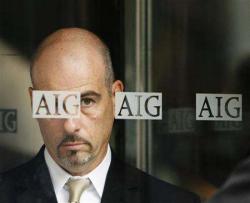
A man walks through a revolving door at an American International Group (AIG) building in New York’s financial district September 16, 2008. REUTERS/Lucas Jackson
The world’s largest insurance company has less than 24 hours to raise $80bn (£45bn) or face collapse, a leading US politician has warned.
The dire diagnosis for American International Group (AIG), made by New York State Governor David Paterson, came amid another day of continued turbulence on the global stock markets.
However despite the turmoil, the US central bank – the Federal Reserve – sprang a surprise by failing to cut interest rates.
Its decision to hold the base lending rate at 2 per cent was met with consternation on Wall Street, where shares, which had been trading positively, plunged.
The leading Dow Jones index fell by 100 points in less than a minute following the announcement.
But it was the future of AIG that was the main topic of debate.
Gov. Paterson said that the insurer, which is the shirt sponsor of Premiership football club Manchester United, had just 24 hours to get its house in order.
“We are in a terrible situation if we let the world’s largest industrial and commercial insurance company go down,” said Gov. Paterson.
He said the company now needed to find between $75-80bn to meet its ongoing obligations.
Talks between US financial regulators and senior bankers continued in a bid to raise the money.
One option under consideration was a lifeline loan being made by a number of banks, while the company itself continued to press the Fed to loan it the money in needs on a short-term basis.
If AIG, which has a $1,000bn balance sheet, does collapse, it would be the largest bankruptcy in American history. The shockwaves that would create would be felt far beyond far those of the weekend’s collapse of investment bank Lehman Brothers.
US presidential candidate John McCain proposed yesterday that the US government order an independent inquiry into Wall Street mismanagement to prevent future financial crises caused “by greed, by excess and by corruption”.
His call for an investigation based on the 9/11 Commission, which reported in 2004 on the terrorist attacks of September 11th 2001, was the first specific response by either presidential candidate to the collapse or foundering of Wall Street giants and the plunging stock market.
Mr McCain, the Republican nominee, and his Democratic rival Barack Obama yesterday rushed to attribute blame for the crisis and to demonstrate who could most feel the pain of voters struggling to pay their bills.
American voters overwhelmingly see the economy as the biggest election issue and the headlines of a “nightmare on Wall Street” have turned the White House race upside down as it enters the final 50 days of a 19-month-long campaign.
Mr McCain has been haunted by his comment this year that the economy was “not something I’ve understood as well as I should” and remarks by Phil Gramm, who was jettisoned as his chief economic adviser after he spoke of a “mental recession” and described America as a “nation of whiners”.
But Mr Obama’s soaring rhetoric of hope and change has often seemed disconnected from the concerns of ordinary voters while his inexperience could make him seem too much of a risk during troubled times.
“Everybody’s at fault here,” Mr McCain told CNBC. “That’s why I think maybe we ought to have a 9/11 commission type thing, because this crisis is very serious and … certainly a threat to our economy.”
By James Quinn in New York and Toby Harnden in Washington
Last Updated: 11:41pm BST 16/09/2008
Source: The Telegraph